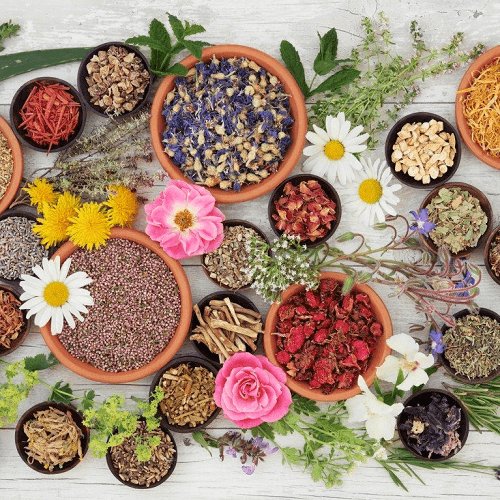Herbs Definition
An herb (or herbaceous) is a plant valued for its medicinal, culinary, or aromatic qualities. Herbs are typically non-woody plants with green and soft stems and usually die back to the ground at the end of the growing season. Herbs can always be grown in gardens or pots, making them readily available in the kitchen.
Basil, thyme, mint, sage, dill, rosemary, parsley, oregano, turmeric, and cilantro are some common herbs. Herbs are frequently used fresh or dried and can be cultivated indoors or outdoors.

Uses of Herbs
- Medicinal uses- Numerous plants cure various illnesses and conditions, including chamomile for relaxing the nerves, ginger for digestive problems, and echinacea for strengthening the immune system.
- Culinary uses- Herbs are frequently used to enhance taste and scent in food preparation. Examples include rosemary in Mediterranean cuisine, basil in Italian, and cilantro in Mexican cuisine.
- Aromatherapy- To induce relaxation, lessen tension, and elevate mood, herbal essential oils are utilized in aromatherapy.
- Beauty and skincare- Several plants, such as lavender for its relaxing characteristics, tea tree for its antimicrobial capabilities, and aloe for its moisturizing properties, are utilized in skincare and beauty products.
- Herbal teas- Several plants, including chamomile for its relaxing effects, peppermint for its digestive advantages, and tea for its antioxidant characteristics, are used to prepare herbal teas.
- Herbal supplements- Several herbs, such as ginseng for vitality, saw palmetto for prostate health, & St. John's wort for depression, are used as dietary supplements.
- Pest control- Due to their strong scents, some plants, including lavender and peppermint, are used to ward off pests naturally.
- Natural dyes- Certain plants, like indigo and turmeric, can be used as natural dyes for clothing and textiles.
- Home cleaning- Some herbs, like baking soda and vinegar, are utilized as natural cleaning chemicals since they may remove dirt & stains without the need for harmful chemicals.
- Traditional medicine- Several civilizations, like Ayurveda in India & Traditional Chinese Medicine, have used plants for ages.
- Spiritual and religious purposes- Certain plants, such as sage & frankincense, are used in purifying and cleaning rites in spiritual and religious ceremonies.
- Bites and stings from insects- Calendula and aloe vera are two plants used to calm and treat bites and stings from insects.
- Healing of cuts and wounds- Chamomile and comfrey are two herbs that are used to hasten the healing of cuts and wounds.
- Pain relief- Herbs like devil's claw and willow bark are used to treat pain and inflammation.
Pros and Cons of Herbs
Pros of herbs
- Natural- As herbs are derived from plants and do not include synthetic chemicals or additions, they are frequently used as a safe and natural substitute for medicines.
- Versatile- For individuals looking for natural cures, herbs are a flexible choice since they may be utilized in many different ways, including cooking, drinks, tinctures, and topical applications.
- Nutritional benefits- Many herbs contain vitamins, minerals, and other essential ingredients that can improve general health and well-being.
- Traditional uses- In traditional medical systems like Ayurveda & Traditional Chinese Medicine, many herbs have been utilized for millennia. They have been proven to be beneficial in treating a variety of health issues.
- Affordable- Growing your herbs at home or buying them in bulk will help you stay within your budget. Herbs are frequently less expensive than medicines.
Cons of herbs
- Absence of control- Unlike medicines, herbs are not subject to FDA regulation. Therefore different brands' products may vary in terms of purity and quality.
- Interactions- Herbs and prescription drugs can interact, resulting in unpleasant effects or decreased efficacy.
- Allergies- Some people may be allergic to or sensitive to specific herbs, which might have adverse effects such as allergic responses.
- Minimal research- While some herbs have been thoroughly investigated, some have not, which implies that their security and efficacy may not be well recognized.
- Dosage- It may be challenging to administer herbs correctly, which might result in either under- or overdose, which may have unfavorable effects.
The Conclusion
From ancient times, herbs have been used for culinary and medical reasons. Although many herbs are used to flavor food, many also contain medicinal qualities that may be utilized to cure various illnesses. Herbs are a valuable and adaptable ingredient in cooking and complementary medicine, but using them sensibly and ethically is crucial.
|

 For Videos Join Our Youtube Channel: Join Now
For Videos Join Our Youtube Channel: Join Now










